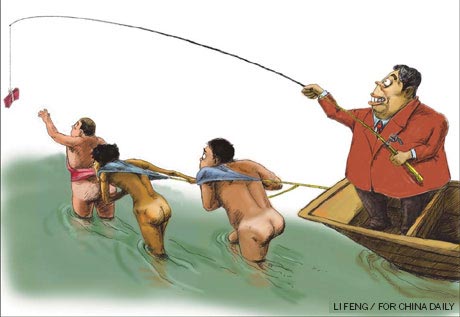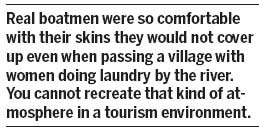
Before the 1980s boat trackers dragged craft up the river wearing nothing, not even a smile. Now, for the sake of tourism, they are back in the camera's frame.
In the past couple of months I have seen several images of naked boat trackers - and they make me laugh. "These are not real boat trackers," I tell anyone who will listen. "They are imposters. Look at their skin. The buttocks are not sun-tanned, you can't fake that. These poor fellows are probably self-conscious about being naked. It's the extra pay that encourages them to appear in their birthday suits."

As far as I know, there have been no real naked boat trackers in China in the past 20 years, and any photos taken during the past decade that claim to be of naked boat trackers are basically just dramatic recreations.
Now, I hear, government authorities in Badong, Hubei province, have revived the practice for the pleasure of camera-toting tourists. But at least they do not attempt to pass them off as the real boatmen.
I still recall my first impression of the naked boat trackers. It was a set of photographs, not the real men, but they were so striking I simply could not take my eyes off them. There was nothing sexual about the nudity, I didn't know what to think.
On reflection, I guess I thought of the images as art and it was only much later that I started asking questions such as: "Why were they naked?" They were poor, but not so lacking in money as to be unable to afford a pair of shorts.
It was not until last year, when I had an assignment in Guizhou, that I found out more about naked boat trackers. They used to drag boats along the Chishui River, as well as the other mighty rivers of China. They did not bother to wear anything because they had to constantly get into the water and it was impractical to change out of wet clothes. This was true mostly in mountainous areas where rapids are treacherous and beaches few and far between.
Life was hard for the boatmen, but they made slightly more than a typical farmer. When the steam engine was widely adopted in the 1980s, it killed the profession. So, the last authentic records of the naked boat trackers are from that era, when cameras were still rare.
The place I visited in Guizhou also tried to recreate the profession of being a naked boat tracker for the sake of tourism. I was shown a few photographs of these "actors" and they had such pale skin and fat stomachs that it was more of a travesty than homage. Obviously they did not have a decent casting director.

So, is it okay to revive the boat tracker as a cultural relic? Most commentators focus on the nudity, which they feel is debasing, but that is a modern urban perspective. Real boatmen were so comfortable with their skins they would not cover up even when passing a village with women doing laundry by the river. You cannot recreate that kind of atmosphere in a tourism environment.
The lack of authenticity in many of China's back-to-the-future approaches to cultural preservation is rooted in the principle of using culture as a promotional tool. The mammoth rituals that celebrate ancient sages - such as Confucius, Lao Tzu, Yao and Shun - have less to do with respecting and reviving Chinese civilization than creating an attraction that funnels money into the jurisdiction. At the very least, there will be photos and glowing commentaries that appear in the media and that local governments see as positive publicity.
I have nothing against promoting tourism with whatever resources a jurisdiction happens to possess. Though some have gone to the ridiculous length of claiming ancient celebrities who led peripatetic lives, many seem to confuse third-rate imitation with first-class genuine stuff.
There are places that tear down hundred-years-old buildings to make way for brand-new architecture in the old style.
Sure, the new buildings incorporate modern functions such as air-conditioning and are probably safer, but they are not the same and do not have the cultural value of real antiquities. Some local planners do not seem to be able to appreciate the difference between a theme park and preservation.
There are borderline cases where the renovation of old buildings or the revival of ancient practices is tastefully done, but overall I don't see anything culturally or commercially viable in the big pageants funded by big money. They are pure theater and they rarely educate or entertain.
Those who preserve old lifestyles best, as I see it, are the restaurants and lodges offered by farmers, known as "farmer's joy". You get to observe up close how locals live their lives and you put money straight into their pockets. The government does a fabulous job by insisting that these farmers do not modernize the style of their homes.
So, what about having a group of young men strip and pretend to pull a boat up stream? It's a bit like having an old lady spinning a cotton loom. You get a glimpse of life as it used to be - and forget, for a while, the pressures of modern life. But there are subtle differences: That old lady probably did spin the loom when she was young, but none of today's young men have ever tracked a boat with ropes.
The old lady in her traditional garb used to be a symbol of backwardness, and is now one of classical finesse. The young, naked trackers, who represent nature, now just look awkward by comparison. Unless they get into training and develop an "authentic look", I'd rather look at the old photos.
raymondzhou@chinadaily.com.cn
相關(guān)閱讀:
(作者周黎明 中國日報網(wǎng)英語點津 編輯陳丹妮)
